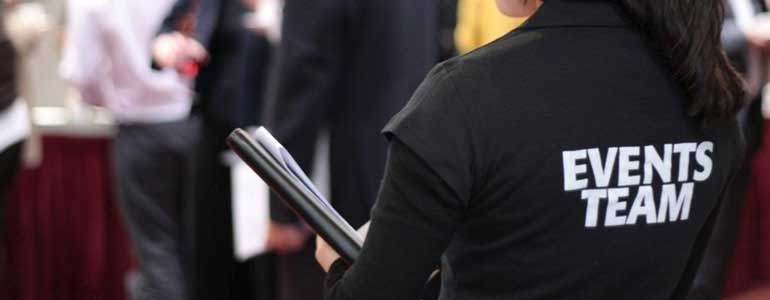How to Build a Strong Event Planning Resume
Being an event coordinator and planner doesn’t happen overnight. While it would be nice to go from zero to world-class events immediately, you got to earn that privilege.
Fortunately, as with other industries, the path to success is relatively straightforward. As long as you apply yourself and follow these tips, you should be able to make your mark on the event planning business in no time.
Step 1: Get your feet wet (make sure you like event planning)
Before you dive into the event coordination pool, you want to make sure that the water accommodates your tastes. The best way to get some preliminary experience is to volunteer (or work) at the events you want to plan later.
 Working these events on the front lines can give you some excellent insight into how to run them from behind the scenes. Pay attention to any issues or challenges that you face as a volunteer or worker.
Working these events on the front lines can give you some excellent insight into how to run them from behind the scenes. Pay attention to any issues or challenges that you face as a volunteer or worker.
From there, you can figure out how to address those problems for future events. Better yet, you can bring up your solutions to your supervisor (or the event coordinator) so that they will take notice of your initiative.
Plus, you will get a better idea whether event planning is right for you.
Step 2: Start networking (at events or word-of-mouth)
Yes, event coordinators will host parties for themselves.
If you’re not familiar with industry groups and organizations, now is the time to find out about them and see if you can get on a guest list. Doing this after volunteering or working at events is ideal since you’ll know more about the industry and the various ins and outs.
When networking, keep these elements in mind to make a good impression:
-
Share your insight - Talk about the industry from your perspective and what you do to make events work. Doing this shows that you have some knowledge of event coordination and can problem-solve.
-
Ask questions - That said, don’t make it seem like an interview. Networking is about finding peers and co-coordinators. Ask about specific events and challenges that they faced and how they overcame them.
-
Make sure to follow up - It’s one thing to get someone’s information to follow up later on. It’s much better to have a specific reason to reach out (or for them to contact you). Maybe you can chat about an upcoming event or opportunity. This option isn’t always available, but try to make it happen.
-
Don't just talk about events - Introduce yourself, interest beyond event planning and try to make real, human connections.
Step 3: Start with smaller events (family, friends, volunteer work)
Work your way up to massive events with thousands of attendees; start small. If you’re new to the industry, you can start by coordinating small-scale house parties or company gatherings. Doing this will not only help you gain experience, but it will also provide a much more forgiving margin of error.
If something goes wrong for a 50-person party, it’s not as much of a disaster as it would be for a 5,000-person event.
 Another option is to get an internship at an event coordination company.
Another option is to get an internship at an event coordination company.
This route is ideal whether you want to work within a company setting or start your own coordination business. Internships provide excellent experience and networking opportunities you can’t find elsewhere.
The other benefit of starting with smaller events is that you can build up a foundation of positive reviews and recommendations. From there, it’s much easier to land new clients when you have reputable references backing up your work.
|
An easy way to plan events Purplepass has everything you need to sell tickets |
Step 4: Join an event planning/coordinator group or organization
Sometimes, you might have to do this step before going to networking events.
However, becoming a member of one or more industry organizations will really beef up your resume. Even better is getting involved within the group and holding a title (i.e., board member, treasurer, etc.). This step adds legitimacy to your experience and can help you find leads for more work.
Keep in mind that you’ll likely have to pay dues and attend conferences or meetings. Joining one of these organizations requires some commitment, so make sure you’re willing to put the time and effort into it.
Where can you find event planning groups?
- Meetup
- LinkedIn groups
- Facebook groups
- Community networking/calendar
- Online networking platforms/websites
Step 5: Get certified
As with joining event coordination groups, a certification adds weight to your resume. When clients or businesses see that you’ve invested in yourself, they’re more likely to do the same.

There are multiple certification options and titles, including:
-
Certified Meeting Professional
-
Certified Special Events Professional
-
Certified Government Meeting Professional
-
Certified Wedding Planner
You’ll want to focus your time and energy on the certification that fits within your niche. If you have no interest in planning weddings, there’s no reason to add that to your resume.
Tips for finding a certification program:
- Make sure it is accredited (officially recognized)
- Decide what type of certification/niche you want to go into
- Check to make sure if the certification applies to your state
- Stick with popular certification programs with reviews/testimonies
Reputable organizations to go through include:
- Convention Industry Council (CIC)
- Meeting Planners International (MPI)
- International Live Events Association
- The National Association for Catering and Events
- Global Business Travel Association
- International Association of Exhibitions and Events (IAEE)
- National Career Certification Board
- Management and Strategy Institute
Bottom Line: build a resume that works
Overall, every line on your resume should reflect some knowledge or real-world experience. So, the longer your resume, the better you’ll be at event coordination.
Now, go out there and conquer the world!






